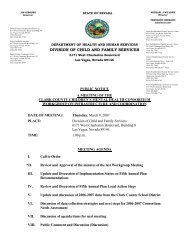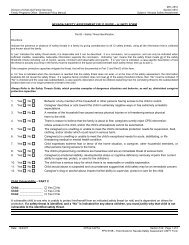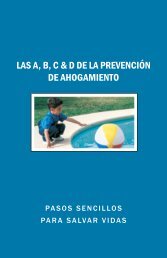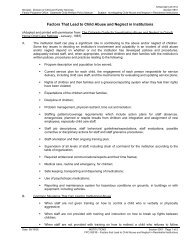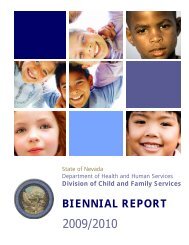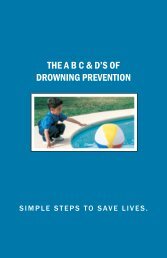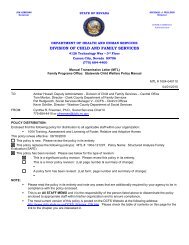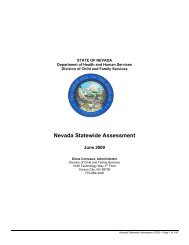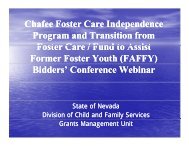STATE OF NEVADA - Division of Child and Family Services
STATE OF NEVADA - Division of Child and Family Services
STATE OF NEVADA - Division of Child and Family Services
Create successful ePaper yourself
Turn your PDF publications into a flip-book with our unique Google optimized e-Paper software.
Prior to this report period, The Nevada Indian Commission provided the Indian <strong>Child</strong> Welfare Committee with a list serve<br />
beginning in November 2008, with the intent to serve as a communication mechanism to facilitate information sharing <strong>and</strong><br />
collaboration between the State, Counties <strong>and</strong> Tribes: NVICWA@listserv.state.nv.us. The State, Counties <strong>and</strong> Tribes<br />
continue to utilize the communication mechanism for information sharing.<br />
The Indian <strong>Child</strong> Welfare Committee decided that regional roundtables held on or near tribes in Northern or Southern <strong>and</strong><br />
Rural Nevada would be more effective in reaching local tribes <strong>and</strong> child welfare agencies.<br />
The Indian <strong>Child</strong> Welfare Committee’s State-Tribal Roundtables’ plan was presented to ITC-N on April 14, 2009. The<br />
purpose <strong>of</strong> the State-Tribal Roundtables was to build upon existing partnerships <strong>and</strong> increase collaboration between<br />
State, County <strong>and</strong> Tribes. The State-Tribal Roundtables provided the forum for information, dissemination, <strong>and</strong> discussion<br />
about the new law: Fostering Connections to Success <strong>and</strong> Increasing Adoptions Act <strong>of</strong> 2008, Public Law 110-351, which<br />
allows tribes direct access to Title IV-E funding under certain conditions. The Casey <strong>Family</strong> Programs facilitated the 2009<br />
State-Tribal Roundtable meetings, the Nevada Indian Commission coordinated logistics <strong>of</strong> each <strong>of</strong> the meetings, DCFS<br />
presented systems overview for greater underst<strong>and</strong>ing <strong>of</strong> the Nevada child serving systems, <strong>and</strong> ITC-N participated as<br />
well.<br />
The State-Tribal Roundtables provided a forum to share information <strong>and</strong> improve provision <strong>of</strong> child welfare services for<br />
Indian children <strong>and</strong> families through consultation to: 1) identify tribal foster care <strong>and</strong> ICWA needs; 2) explore Title IV-E<br />
funding <strong>and</strong>/or agreements; <strong>and</strong> 3) provide technical assistance as indicated.<br />
• Building State-Tribal Partnerships: Regional Roundtable<br />
Meeting on May 21, 2009, at Las Vegas Indian Center; Las Vegas, Nevada.<br />
Meeting on June 30, 2009, at the Te-Moak Shoshone Tribal Diabetes Center; Elko, Nevada.<br />
Meeting on July 27, 2009, at Nevada Urban Indian Center; Reno, Nevada.<br />
Increased participation <strong>of</strong> Tribes during the CFSR <strong>of</strong> 2009<br />
1. Inter-Tribal Council Meeting-Building State-Tribal Partnerships<br />
A report to State, County <strong>and</strong> Tribal leaders was facilitated by DCFS on August 18, 2009 at the Nevada Health<br />
<strong>Division</strong>.<br />
Workgroups<br />
Ongoing consultation with Nevada Tribes was conducted on ICWA policies <strong>and</strong> procedures <strong>and</strong> the development<br />
<strong>and</strong>/or improvement <strong>of</strong> at least one policy or protocol. Tribal discussion during the Indian <strong>Child</strong> Welfare Steering<br />
Committee Meetings <strong>of</strong> 2009; called for the formation <strong>of</strong> a workgroup to create a draft memor<strong>and</strong>um <strong>of</strong> underst<strong>and</strong>ing<br />
(MOU) for the child serving agencies in Nevada. The MOU Workgroup was created to clearly define the issue <strong>and</strong><br />
how to approach appropriate service referral <strong>and</strong> delivery. The workgroup addressed the issue <strong>of</strong> non-enrolled or<br />
non-Native children residing on Indian reservations <strong>and</strong> who should serve these children across jurisdictions. The<br />
CJA Task Force Indian <strong>Child</strong> Welfare Committee formed a workgroup to develop a formal charter for the<br />
membership. The charter defines the purpose <strong>of</strong> the committee <strong>and</strong> outlines the goals <strong>and</strong> objectives <strong>of</strong> the work.<br />
The workgroup convened on March 29, 2010 to finalize the charter to be presented at the first meeting <strong>of</strong> 2010. The<br />
Indian <strong>Child</strong> Welfare Committee will reconvene in the spring <strong>of</strong> 2010 with plans to hold regional roundtable meetings<br />
during the summer <strong>of</strong> 2010.<br />
• Protecting our <strong>Child</strong>ren <strong>and</strong> Sustaining our Families Indian <strong>Child</strong> Welfare Track<br />
This was held in Reno, Nevada, on November 17 – 18, 2009. The Indian <strong>Child</strong> Welfare Track was part <strong>of</strong> the 44 th<br />
Annual Inter-Tribal Council <strong>of</strong> Nevada (ITC-N) Convention. The Indian <strong>Child</strong> Welfare Track was coordinated by the<br />
CJA Task Force Indian <strong>Child</strong> Welfare Committee. Representatives were included from the Bureau <strong>of</strong> Indian Affairs<br />
(BIA), ITC-N, National Council <strong>of</strong> Juvenile <strong>and</strong> <strong>Family</strong> Court Judges, <strong>and</strong> <strong>Division</strong> <strong>of</strong> <strong>Child</strong> <strong>and</strong> <strong>Family</strong> <strong>Services</strong><br />
(DCFS) staff. The convention included a panel consisting <strong>of</strong> representatives from DCFS <strong>Family</strong> Programs Office, BIA,<br />
Court Improvement Program, <strong>and</strong> the Nevada Indian Commission which presented information on the CJA Task<br />
Force Indian <strong>Child</strong> Welfare Committee <strong>and</strong> provided updates in regard to the regional State-Tribal Roundtables during<br />
the general session. The Indian <strong>Child</strong> Welfare Committee provided the keynote speaker for the convention’s first<br />
general session. Nationally-recognized Indian <strong>Child</strong> Welfare expert Judge William Thorne, <strong>of</strong> the Utah Court <strong>of</strong><br />
Appeals, presented “In the Spirit <strong>of</strong> ICWA, We All Need to Work Together to Help Our <strong>Child</strong>ren.” Judge Thorne<br />
provided the American Indian perspective on historical trauma in terms <strong>of</strong> the Boarding School era, effects on the<br />
Nevada APSR – SFY 2010<br />
Page 78 <strong>of</strong> 108



